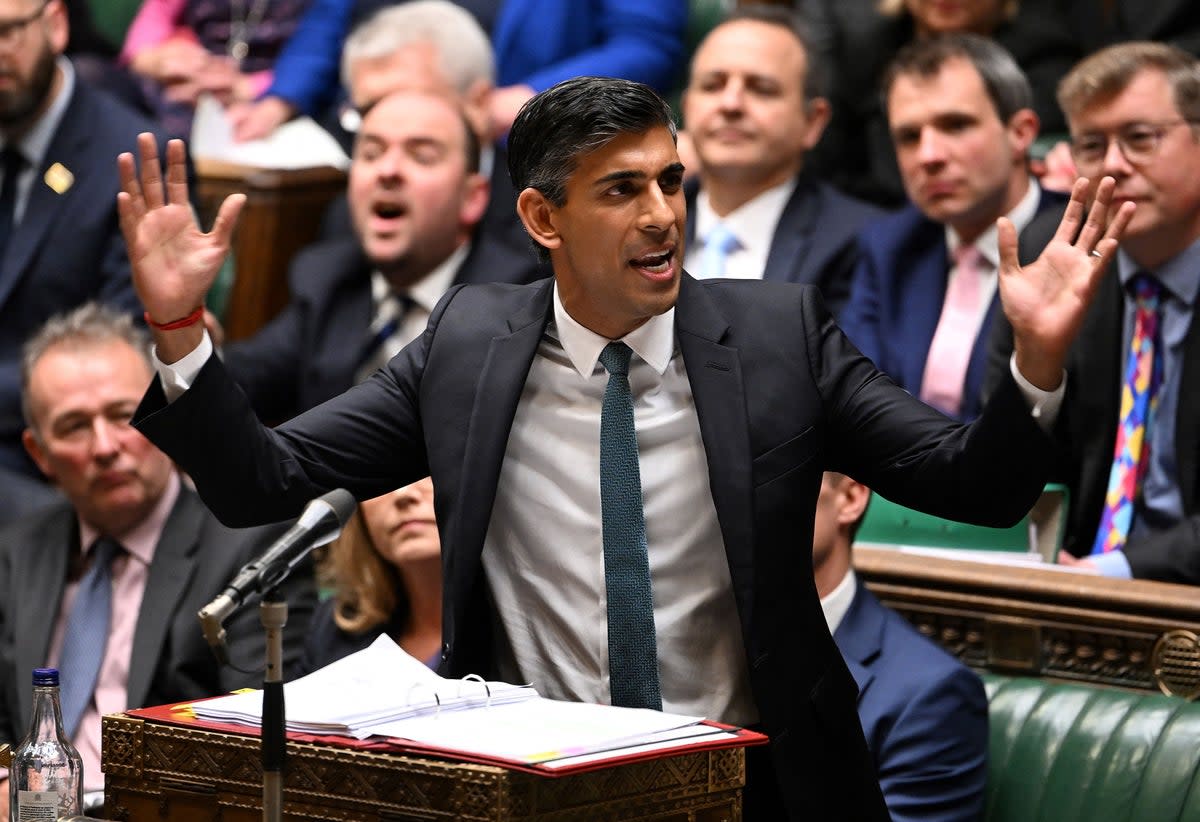Rishi Sunak defends Suella Braverman reappointment as PM restores fracking ban

Rishi Sunak has defended reappointing Suella Braverman as home secretary as the new Prime Minister was accused by Sir Keir Starmer of a “grubby deal” in their first PMQs clash.
Mr Sunak said he was “delighted” to enlist the MP, who was the shortest-serving home secretary in history when Liz Truss dismissed her, to his “united Cabinet”.
But the Prime Minister faced mounting questions over the move amid calls for an official inquiry into Ms Braverman breaking the ministerial code by sharing a sensitive document with a Tory backbencher from a personal email.
Mr Sunak defended her appointment at his first Prime Minister’s Questions on Wednesday, saying: “The Home Secretary made an error of judgment but she recognised that, she raised the matter and she accepted her mistake.
“That is why I was delighted to welcome her back into a united cabinet that brings experience and stability to the heart of Government.”
But Labour leader Sir Keir said: “He’s so weak, he’s done a grubby deal trading national security because he was scared to lose another leadership election.”
Ms Braverman, who had been in the role six weeks when she was forced out, said she made a “mistake” which she conceded was a “technical infringement” of the rules.
But questions remain about why she sent the document to fellow right-winger Sir John Hayes and how she accidentally copied in an aide to another MP, who sounded the alarm.
Downing Street denied reports that Cabinet Secretary Simon Case is “livid” over her swift return and “very concerned” about the breach.
“There were reports about the Cabinet Secretary’s reaction which I certainly don’t recognise,” the Prime Minister’s official spokesman said. “There was a report about him being livid.”
But he declined to deny suggestions that Mr Sunak had been advised by officials against rehiring Ms Braverman.
Instead he said: “I’m simply not going to be drawn more into what advice ministers, or indeed prime ministers, receive from officials.”
No 10 did say that Mr Sunak will “shortly” appoint a new independent ethics adviser, filling a gap left by Ms Truss after Lord Geidt quit in June after a challenging period advising Boris Johnson.
But the spokesman declined to say whether the new adviser would be asked to investigate Ms Braverman.
Both Labour and the Liberal Democrats raised “national security” concerns and demanded a Cabinet Office investigation.
Shadow home secretary Yvette Cooper wrote to Mr Case demanding an investigation “into the extent of this and other possible security breaches”.
“Given the Prime Minister’s decision to reappoint her to the Cabinet post overseeing national security, it is vital for the public to have transparency on what occurred,” she wrote.
“It must include the extent of the Home Secretary’s use of private email accounts to circulate Government papers and the extent to which official documents have been sent outside Government, as well as any other concerns that have been raised about possible serious information and security breaches by Suella Braverman.”
The Lib Dems also demanded an inquiry into Mr Sunak’s decision to reappoint her “including any promises Sunak made to her behind closed doors”.
Chancellor Jeremy Hunt defended her reappointment, but declined to say whether he trusts Ms Braverman, with the leaked information in question said to have been market sensitive.
Mr Hunt told broadcasters: “She apologised for her mistakes. She’s been fully accountable for those mistakes, she stepped down as Home Secretary.
“But from the point of view of people at home, who want stability in the economy, they also need to see a united Conservative Party and that’s why the Prime Minister has put together a Cabinet of all the talents.”
Former senior civil servant Lord McDonald said the reappointment was a “political” move by Mr Sunak, but one that was within his gift as Prime Minister.
Facing the Opposition in Parliament for the first time as Prime Minister, Mr Sunak promised to restore economic stability after his predecessor Liz Truss’s tax plans triggered market chaos.
Mr Sunak ripped up more of Ms Truss’s flagship policies, reinstating a moratorium on fracking for shale gas that she had lifted.
Plans for large-scale deregulation of the economy, part of Truss’ vision to unleash economic growth, are also under review, Mr Sunak’s spokeswoman said.
Mr Sunak, who took office on Tuesday, has appointed a government that mixes allies with experienced ministers from the administrations of Ms Truss and Boris Johnson.
In his latest phase of appointments on Wednesday evening, former Transport Secretary Anne-Marie Trevelyan was made a minister in the Foreign Office, while Chris Philp was moved from Paymaster General to the Home Office.
Alex Chalk was made a defence minister, Lucy Frazer was handed a role in the Department for Levelling Up, Housing and Communities, and Helen Whately was given a job in the Department of Health and Social Care.
Greg Hands, Steve Baker and Baroness Williams have also been reappointed to the roles of trade minister, Northern Ireland minister and chief whip in the Lords, respectively.
One of Mr Sunak’s first acts was to delay the upcoming fiscal statement due on Halloween until November 17, so the government can use the most accurate possible forecasts as it seeks to tackle the cost-of-living crisis.
“We will have to take difficult decisions to restore economic stability and confidence,” Mr Sunak told the Commons. “We will do this in a fair way.”
Cabinet minister Michael Gove, brought back to government by Mr Sunak after being fired by Mr Johnson and sidelined by Ms Truss, said it was time for the Conservatives “to get back to the business of Government in a quiet way.”
“After 12 months of turbulence, after a rolling news buffet, an all-you-can eat story extravaganza ... boring is back,” he said during a speech in London.

 Yahoo News
Yahoo News 
